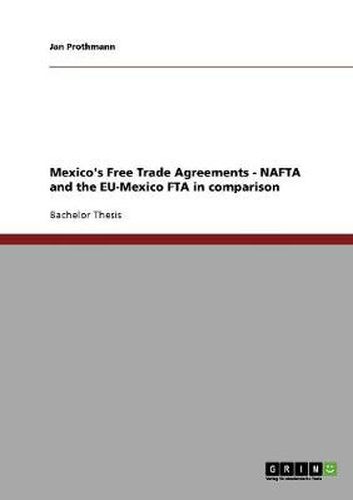Readings Newsletter
Become a Readings Member to make your shopping experience even easier.
Sign in or sign up for free!
You’re not far away from qualifying for FREE standard shipping within Australia
You’ve qualified for FREE standard shipping within Australia
The cart is loading…






Bachelor Thesis from the year 2005 in the subject Economics - International Economic Relations, grade: 1,0, Joenkoeping International Business School, course: Economics, 26 entries in the bibliography, language: English, abstract: Mexico has concluded various free trade agreements over the last decade, with NAFTA and the EU-Mexico FTA being the most important ones. In this paper, the effect of both agreements on bilateral trade is presented through descriptive statistics on the one hand, and by applying a time series analysis in the form of an export and import demand function on the other. The results of the graphical analysis indicate that the coming into force of NAFTA has led to a rise in Mexico’s trade with that bloc, even though the econometric analysis does not support the assertion that the conclusion of the agreement is responsible for that. The EU-Mexico FTA has not led to a significant rise in Mexico’s exports to the EU, mainly due to transport costs. These costs are also the dominant factor in explaining exports from Mexico to its NAFTA partners, and therefore lead to the conclusion that the change in transport costs over time is more important than tariff reductions granted by the parties. Interestingly, Mexico’s imports from these two blocs are mainly determined by Mexico’s GDP and the exchange rate, rather than by transport costs.
$9.00 standard shipping within Australia
FREE standard shipping within Australia for orders over $100.00
Express & International shipping calculated at checkout
Stock availability can be subject to change without notice. We recommend calling the shop or contacting our online team to check availability of low stock items. Please see our Shopping Online page for more details.
Bachelor Thesis from the year 2005 in the subject Economics - International Economic Relations, grade: 1,0, Joenkoeping International Business School, course: Economics, 26 entries in the bibliography, language: English, abstract: Mexico has concluded various free trade agreements over the last decade, with NAFTA and the EU-Mexico FTA being the most important ones. In this paper, the effect of both agreements on bilateral trade is presented through descriptive statistics on the one hand, and by applying a time series analysis in the form of an export and import demand function on the other. The results of the graphical analysis indicate that the coming into force of NAFTA has led to a rise in Mexico’s trade with that bloc, even though the econometric analysis does not support the assertion that the conclusion of the agreement is responsible for that. The EU-Mexico FTA has not led to a significant rise in Mexico’s exports to the EU, mainly due to transport costs. These costs are also the dominant factor in explaining exports from Mexico to its NAFTA partners, and therefore lead to the conclusion that the change in transport costs over time is more important than tariff reductions granted by the parties. Interestingly, Mexico’s imports from these two blocs are mainly determined by Mexico’s GDP and the exchange rate, rather than by transport costs.